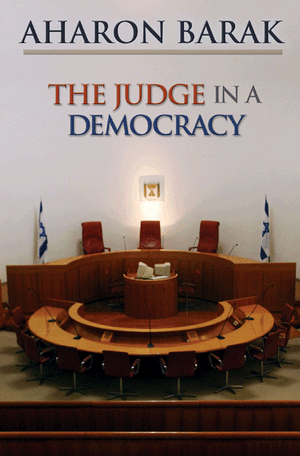The review is vintage Bork. He calls Barak's book "a textbook for judicial activists." He notes that:

Bork concludes:Barak celebrates the growth in virtually all Western nations of judicial power at the expense of other governmental and private institutions. He notes approvingly that “since the end of World War II, the importance of the judiciary relative to the other branches of the state has increased. We are witnessing a strong trend toward the ‘constitutionalization of democratic politics.’” The phrase is misleading. To constitutionalize democratic politics is to remove them from control by the people and turn politics over to judges. Once an issue is constitutionalized, democratic politics ends. There is a strong and all-pervasive suspicion of democracy in this book, as indeed there was in Barak’s performance on the bench. He seeks to deny the authoritarian nature of the trend he applauds by re-defining democracy, which consists, according to Barak, of two parts: “Formal democracy” (the rule of the people through elected representatives) and “substantive democracy” (including an independent judiciary, the rule of law, and human rights).
Judicial vetoes of majority decisions may or may not be proper in a given case, but one thing they are not is a form of democracy. They are a check on democracy. Barak’s assertion that both the people’s decisions and the frustration of those decisions are “democracy” obliterates the distinction between rule by elected representatives and rule by judges. This, in turn, serves to justify ever-increasing judicial power. The constitutionalization of democratic politics means that courts will govern when there is no constitutional support for their actions. That is frequently the case in the United States and, as the rulings of Barak’s court show, is even more so the case in Israel.
Alexander Hamilton, in Federalist 78, wrote that “the judiciary, from the nature of its functions, will always be the least dangerous to the political rights of the Constitution,” because it “has no influence over either the sword or the purse.” Hamilton badly underestimated the capacity of the Supreme Court to go well beyond its constitutional mandate, but the Israeli court, by its assertion of the power to control both sword and purse, may well be the branch most dangerous to the political rights of the nation.Bork doesn't consider whether courts might play a more important role in facilitating democracy in a regime plagued by an overreaching executive. For the rest, click here.
For a very different, less ideologically charged, take on the book, Menachem Hofnung, Department of Political Science, the Hebrew University of Jerusalem reviews the English and Hebrew language versions of the book together in the Law and Politics Book Review, noting that "The Hebrew version explains Barak’s legal philosophy while speaking to a Jewish audience suspicious of the Court and seeing it as a bastion of western liberal values. The English version targets an international audience, which sees Israel as a closed society somewhat detached from universal values." He finds both versions "quite successful,...engaging and intellectually stimulating,...a must read in any course or research on judicial and constitutional politics."